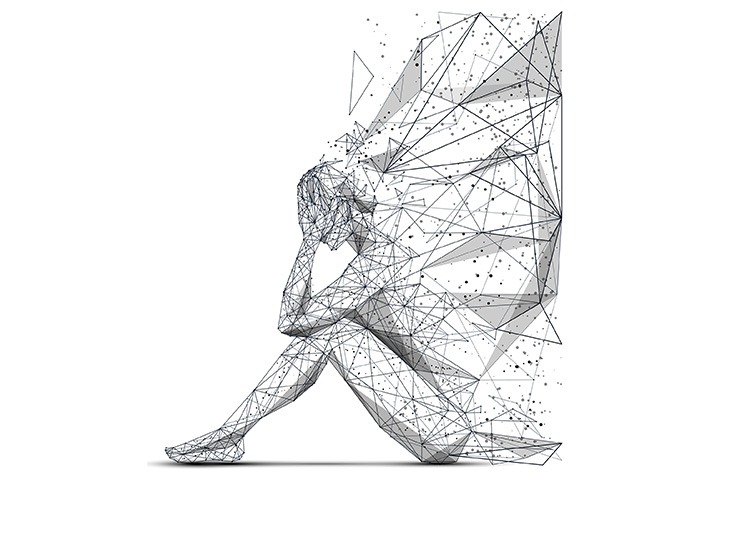Mental health and suicide prevention – how can the security sector help?
The security sector is increasing its focus on how to respond to those experiencing mental illness and how to support mental wellbeing. In this article, security professional Dominic Chandler shares a diary of his experience of mental illness and the lessons that can be learnt.
As a society, we have opened up about mental health over the past few years with various campaigns and slogans: ‘It’s ok not to be ok,’ ‘Speak up, don’t man up’ etc. But in the security industry, can we do that? What happens when one of us within the sector is ‘not ok’? What do we do? That typical British ‘stiff-upper lip’ mentality, ‘plough on’.
The agony of the lose of a close family member
So, where do I begin? January 3rd 2020. Like any normal day. That was, until my father stepped through the front door at about 17:30. He announced that a close family member was dead– the details of which became apparent later. I’m not going to go into details but suffice it to say, she ended her own life. What followed was pure agony for my family.
Working through the pandemic
March 23rd 2020: Lockdown announced. We had 13 hours’ notice that our security team (two of us with a weekend agency officer) were going to go to 12-hour day-night split working, instead of our usual working pattern of 17:00–01:00 / 01:00–08:30. Like most at the time, we thought it would blow over in a month or so, so we could hack alternating 66 / 72-hour weeks. Stiff upper lip and all that, typical British attitude. Oh, how wrong we were!
It became pretty tiring around July / August, but we did manage some holiday days! Fast forward to Christmas time, our client had started to pack up as they were moving out. Oh boy, ANOTHER TUPE! We had already experienced our fair share of these.
Starting university
January 2021 saw a ‘new beginning’, with a new client and employer. On the whole, 2021 saw many changes and required adjustments. For me, one of the biggest was deciding to start university in October on a distance learning course.
Blackdog and calling for help
I had my first Christmas Day off for seven years in 2021. This was very special. I felt privileged to spend the day with my family. But I knew within myself I wasn’t right. As Churchill famously called it, the ‘black dog didn’t go’. So I did something I thought I’d never do – ADMIT I needed help. The individual I messaged did respond and we had a phone call later that day – proof that when your back is against a wall, help is out there. You just need to be brave and admit, ‘I’m not ok.’
Unfortunately, I went further down that ‘black hole’ in the intervening days. Things came to a head in January 2022. The next sequence of events happened within 24 hours, proving just how quickly someone can spiral. After fighting the internalised battle for months, I got to the stage of I thinking ‘I can’t do this any more’ and wrote again to my friend, thanking her for her help, friendship and multiple Zoom calls. She made contact with one of the university tutors. I was then contacted by the campus security team (the irony of this will never be lost on me!). I was then referred to the student wellbeing team, whom, I must say, were incredible.
The following morning, due to the sheer mental overwhelm, I wrote a LinkedIn post (now deleted) to the effect: ‘How do people deal with their own toxic thoughts?’ It wasn’t my connections within mental health who reached out, but my connections within the security sector. I am pleased to say that in the end, albeit via very unconventional methods, I did get help from my best friends, who just so happened to be work colleagues who were instrumental to my recovery and I shall be forever grateful to them and also the wider network of great people around me, many of whom are friends. One thing I shall, however, never forgive is the attitude of a line manager. After everything I had gone through with my mental health and starting the recovery, he told me I needed to ‘man up’. Words have an impact. To me, this was unacceptable behaviour to use, but it summarises some attitudes in the industry.
Mental health and the security sector
Following my experiences, much reflection has been done. As a sector, we are recognising the importance of mental health across the industry, but we need to do more, much more. In 2022, 5,275 suicides were registered in England, equivalent to a provisional rate of 10.6 suicide deaths per 100,000 people (Office for National Statistics, 2023).
Perhaps SIA training for those on the front line should include Mental Health First Aid (MHFA) training. However, that would not come without its challenges and the sector, especially the front line has enough of those. A recent SIA report states: ‘The challenge is retaining staff due to the role’s pressure and risks. Attracting new staff with low pay, increased training costs, vetting difficulties, and other factors make the industry unattractive to younger people.’
Things, however, are improving. This year saw two events; MENTAL HEALTH – Security’s Invisible Enemy (Corps Security, 2023) and ‘United Together: Let’s Talk about Mental Health and Wellbeing in the Security Sector’, hosted by The Security Institute and Mitie. (Disclosure, I was a speaker at this event.)
In July 2023, the Consortium for the Prevention of Suicide, lead by Vicki Vidler, in collaboration with AKT Productions and contributing partners, released a short film on YouTube entitled ‘Courage’ (trigger warning – contains references to suicide) a film about suicide, hope and courage.
We are talking more and improving, but we have a long way to go.
Dominic Chandler
dominicchandler@btinternet.com

